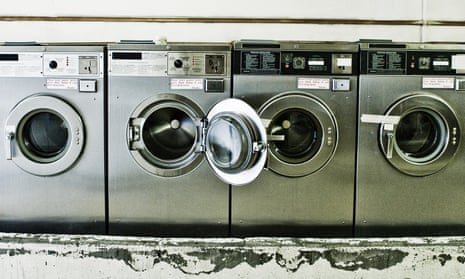What is the Laundromat?
The Laundromat is a name given by the Organized Crime and Corruption Reporting Project to a vast money-laundering scheme. Between autumn 2010 and spring 2014 Russian officials and insiders moved billions of dollars into Europe, the US and other countries. Law enforcement officers in Moldova and Latvia have tracked down at least $20bn in dirty money. They believe the real total may be as high as $80bn. Not all of those involved in the Laundromat have been identified.
What is money laundering?
A process where you take money gained from crime and clean it so that it appears to have come from a legitimate source. Typically this involves multiple transactions.
How did the Laundromat work?
The scheme was ingenious. In many cases, it involved fictitious companies. Most were registered in London at Companies House. Typically, company A “loaned” a large sum of money to company B. Other businesses in Russia – fronted by Moldovans – would then guarantee these “loans”. Company B would fail to return the “money”. Moldovan judges would authenticate the “debt”, allowing Russian companies to transfer real money to a bank in Moldova. From here, the cash went to a bank in Latvia, inside the EU.
Who else was involved?
At least 19 Russian banks. One of them was the Russian Land Bank (RZB). It laundered $9.7bn. From accounts in Russia, money was sent to other accounts at Moldindconbank in Moldova. From there it was transferred to Trasta Komercbanka, in Latvia’s capital, Riga. In Moldova, 15 judges are awaiting trial, together with 10 senior bank managers, central bank officials and four bailiffs. All face money-laundering charges. Ukrainians and Moldovans appear in the scheme too, typically as “directors” of fake UK companies. Most had no clue they were frontmen for a major international scam.
Where did the money go?
Everywhere. The $20bn went via the global financial system to 96 countries. That includes bigger nations such as the US, UK, Germany, France and China, and smaller ones like Slovenia and Taiwan. The money flowed through 21 hub companies, with names such as Seabon and Valemont Properties Ltd. The majority were registered in the UK and made brief annual records. Some were based in Cyprus, an EU island with Moscow ties. Their owners or beneficiaries are hidden behind a network of shadowy offshore administrators.
What about the UK?
The total sent to UK bank accounts was $738.1m. Records obtained by the OCCRP show how some of it was spent: on furs, diamonds, designer chandeliers, and fees at one of Britain’s top private schools. It was used to book rock bands to play in Russia, including a long-haired outfit from Florida. It went on home cinema equipment, and expensive wallpaper. Some of the money flowed into London real estate, including a pub in Bloomsbury and a townhouse in Kensington. All major British banks processed money that had already been laundered. The government-owned Royal Bank of Scotland processed $113.1m, and HSBC $545.3m.
And the US?
More than $63m went to the US. Leading American banks were involved, including Citibank and Bank of America. The cash went on aesthetic dentistry, consulting, luxury diving watches and other items. The only banks that raised money-laundering concerns were American ones. The Bank of New York Mellon rejected payments.
Who benefited from the Laundromat?
The Laundromat functioned as a giant shadow banking system. At the top were a number of users and super-users, all impeccably connected to the Russian elite. Some Russian businessmen importing goods into Russia used the scheme unwittingly. They hired third-party logistics companies to deal with Russian customs. These freight forwarding firms made heavy use of the Laundromat. There are suspicions that well-connected bureaucrats took a cut.
Has anyone been arrested?
Yes. The alleged architect of the scheme is a Moldovan businessman, Vyacheslav Platon – a former MP and Moldindconbank shareholder. Ukrainian police arrested him in 2016 and extradited him to Moldova to face fraud and money-laundering charges. Platon calls the accusations “drivel”. He says there is no evidence of a “predicate crime”: that the money sent from Russia was stolen. Platon is a Russian and Moldovan citizen. He blames his arrest on others. Meanwhile, banks including RZB and Baltica in Russia and Trasta Komercbanka in Latvia have been shut down for money laundering. The Laundromat firms were dissolved in 2015-16.
Who is investigating?
Moldova, Latvia and possibly Russia. Investigators have spent months assembling bank records and chasing down complex money trails. In 2014 two officers from Russia’s FSB spy agency visited detectives in Moldova. They took away records. It is unclear if this was a genuine investigation or an attempt to discover how much the Moldovans knew. Probably the latter. This month Moldova said its diplomats were being “treated abusively” whenever they entered Russia. Moldova linked this harassment by Russian security services to its ongoing Laundromat investigation. It said Russian law enforcement was “totally uncooperative”.









